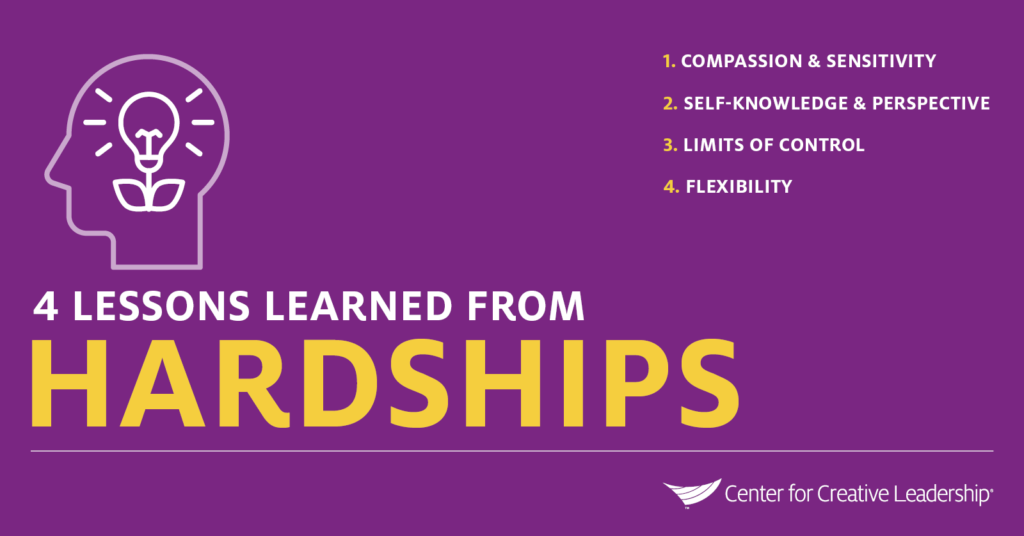Pain touches everyone. If you’re lucky, the toughest times in your life will be fleeting. But some hardships — including the global coronavirus pandemic and its aftermath — may linger for years, and continue to present new challenges for individuals and organizations.
Hardships aren’t asked for and aren’t usually welcomed. They’re not something you would plan into your development in the coming year. Yet, hardships are unavoidable.
The good news is, adversity can actually be a powerful teacher.
The Most Common Hardships From The Lessons of Experience
At CCL, we have a long history of studying the lessons learned from hardships and the way people learn them. The body of work — called The Lessons of Experience research — has been conducted over 5 decades across 40 countries. In the research, we’ve found that most hardships fall into 4 categories:
- Personal Trauma: Often unexpected and shocking, personal trauma is generally an experience you can’t control, and that causes feelings of confusion or loss. This could be anything from the coronavirus pandemic to a death in the family to surviving a car crash.
- Discrimination & Injustice: Whether it occurs in the workplace or another part of your life, experiencing discrimination or injustice is one of the most common hardships. This involves a wide range of subtle and overt, intentional and unintentional behavior and actions that can cause long-lasting negative consequences.
- Mistakes & Failures: Such mistakes can be technical, professional, ethical, or strategic — for example, a product malfunction, a poor hiring decision, a loss of credibility, or a collapsed venture. It can often feel difficult to bounce back from these failures, especially if they’re larger in scale, tied to a deeper workplace culture or issue, or far-reaching in their impact.
- Career Setbacks: Sometimes career setbacks are unavoidable or out of your control. It could be organization-wide layoffs, a freeze on hiring or promotions, a company reorganization, or a wide array of less severe but nonetheless significant events.
In most learning and development work, we follow the classic 70-20-10 rule, trying to find ways to provide people with challenging — or stretch — assignments, such as taking on a new role or difficult assignment. Sometimes called “heat experiences,” the majority of learning from these challenges comes from the success of meeting them.
Hardships are similar in that we learn from pushing through the challenge we face. By facing an initial lack of success with resilience, we can actually grow considerably more through reframing how we approach these difficult experiences.
Though hardships were long an overlooked influence on leadership learning, people are beginning to recognize now that they can be mined for key leadership lessons.
4 Lessons Learned From Hardships & Adversity
Hardships can bring unexpected gifts if we’re open to gleaning lessons from them. While this isn’t automatic, anyone can find and embrace these silver linings. Here are 4 lessons learned from hardships.
What We Learn From Hardships
1. Compassion & Sensitivity.
A significant dose of humility usually comes with hardship. It’s never easy to confront the truth that you aren’t perfect, invincible, or immune to difficult or even terrible things. But going through hardship can open your eyes to the hardships of others. Receiving support and help from others may motivate you to give support more readily. Your sense of compassion can grow.
2. Self-Knowledge & Perspective.
Hardships force you to come face-to-face with who you are. Lessons learned from hardships often reveal limitations, patterns, beliefs, and skills you didn’t see or appreciate before. This shift, which increases self-awareness, is powerful. You have the chance to make new choices based on what matters; how you act, think, and feel; and what you can and can’t do.
3. Limits of Control.
As much as you might want to chart your own path, hardship is a powerful reminder of the limits of your own control. By acknowledging and embracing those limits on your power, you can put down some of the weight you’re carrying and accept that some things aren’t up to you.
4. Flexibility.
Surviving hardship and willing yourself to move forward builds added strength to tackle new challenges and face future failures. Flexibility allows you to be resilient and durable as things change. It teaches you to be open to learning and agile as you figure out what to do next.
When you’re in the middle of a really tough time, these gifts may seem far away or irrelevant — but they’re invaluable.
How to Learn Lessons From the Hardships You Face
6 Ways to Grow from Adversity
Here are a few suggestions to help you glean silver linings from difficult times:
1. Don’t let the hardship be everything.
Rest, exercise, and make time for wellness where you can. Spend time — even if it’s remotely — reconnecting with people who make you laugh, and do things that get your mind off your troubles. Recovery time, even if in small amounts, is essential for learning.
2. Don’t be ashamed of failures, mistakes, or struggles.
To learn, you need to reflect on the experience. Plus, reluctance to talk to others or get support can make your hardship that much more difficult to overcome. Instead of beating yourself up over it, figure out what you can do differently in the future, and keep moving forward.
3. Avoid defensiveness.
Resist the temptation to put the blame on the situation or others’ shortcomings. Try not to react defensively when other people give you feedback or point out things you are (or aren’t) doing. Denying problems or shifting blame away from yourself will not serve you in the long run.
4. Keep asking questions.
Reflect:
- How might this hardship be a new challenge?
- What might I learn as a result?
- How might lessons from past experiences apply?
- How am I feeling?
- What’s my intuition telling me?
- What are my actions telling me about what’s working and what’s not working?
- What can I learn from what I and others did in this situation?
- What feedback do I need to seek from others?
- How might this help me going forward?
5. Connect with others.
If you’re experiencing discrimination, bias, or injustice, reach out to people who can relate or support you. Internalizing the experience won’t help you or anyone else, and it will only allow the situation to fester. Identify people you trust and figure out how you’d like to proceed.
6. Look back to find your lessons of experience.
Hardships aren’t the main way people learn — experience is the primary teacher. Our Lessons of Experience research tells us that almost a quarter of all leadership development stems from hardships. That’s more than classroom experiences or formal training opportunities, meaning that what you’re going through right now could be a powerful catalyst on your leadership journey. Consider using our Experience Explorer™ activity for yourself and others.
Hardship is painful. But if you can learn from it, and turn it into an opportunity for growth, you gain something back that stays with you forever.
Ready to Take the Next Step?
Help your leaders learn to extract lessons from hardships they face, maintaining resilience while handling uncertainty and setbacks. Equip them with a customized learning journey using our research-backed modules. Available leadership topics include Change & Disruption, Conflict Management, Emotional Intelligence, Learning Agility, Psychological Safety, Resilience-Building, Self-Awareness, and more.













